
-
 China consumption slump deepens as February prices drop
China consumption slump deepens as February prices drop
-
Phone bans sweep US schools despite skepticism
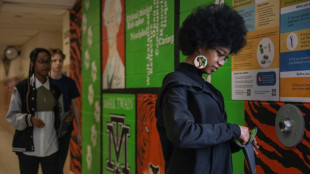
-
 Some 200 detained after Istanbul Women's Day march: organisers
Some 200 detained after Istanbul Women's Day march: organisers
-
'Grieving': US federal workers thrown into uncertain job market

-
 Remains of murdered Indigenous woman found at Canada landfill
Remains of murdered Indigenous woman found at Canada landfill
-
Women will overthrow Iran's Islamic republic: Nobel laureate

-
 Women step into the ring at west African wrestling tournament
Women step into the ring at west African wrestling tournament
-
Trump's tariff rollback brings limited respite as new levies loom

-
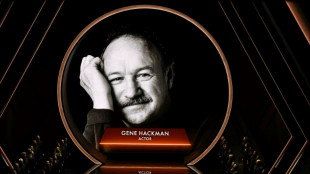 Hackman died of natural causes, a week after wife: medical examiner
Hackman died of natural causes, a week after wife: medical examiner
-
Oops, we tipped it again: Mission over for sideways US lander
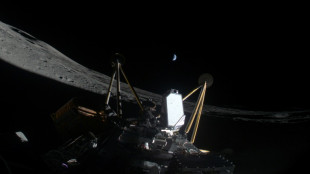
-
 Cyclone Alfred downgraded to tropical low as it nears Australia
Cyclone Alfred downgraded to tropical low as it nears Australia
-
Global stocks mixed as Trump shifts on tariffs weighs on sentiment

-
 Trump says dairy, lumber tariffs on Canada may come soon
Trump says dairy, lumber tariffs on Canada may come soon
-
Trump cuts $400 mn from Columbia University over anti-Semitism claims

-
 US Fed chair flags policy uncertainty but in no rush to adjust rates
US Fed chair flags policy uncertainty but in no rush to adjust rates
-
Adopted orphan brings couple 'paradise' in war-ravaged Gaza

-
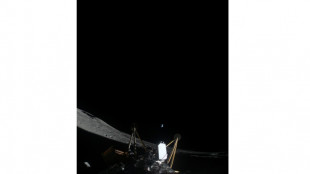 Oops, we tipped it again: Mission over for private US lander
Oops, we tipped it again: Mission over for private US lander
-
Greenland's mining bonanza still a distant promise

-
 Pope 'stable' as marks three weeks in hospital with breathless audio message
Pope 'stable' as marks three weeks in hospital with breathless audio message
-
Shares slump on Trump tariffs tinkering, jobs

-
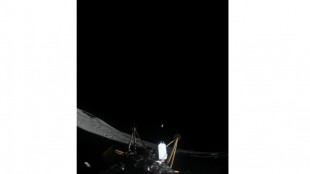 Mission over for private US lander after wonky landing
Mission over for private US lander after wonky landing
-
Thousands stranded as massive WWII bomb blocks Paris train station

-
 UK court cuts longest jail terms on activists, rejects 10 appeals
UK court cuts longest jail terms on activists, rejects 10 appeals
-
US hiring misses expectations in February as jobs market faces pressure

-
 S.Sudan heatwave 'more likely' due to climate change: study
S.Sudan heatwave 'more likely' due to climate change: study
-
US company says Moon mission over after landing sideways again
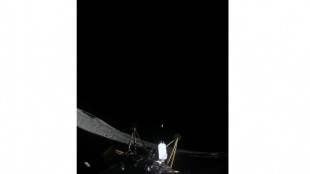
-
 Trump says farmers keen to quit 'terrible' S. Africa welcome in US
Trump says farmers keen to quit 'terrible' S. Africa welcome in US
-
US stock markets rise as investors track Trump tariffs, jobs

-
 US hiring misses expectations in February, jobs market sees pressure
US hiring misses expectations in February, jobs market sees pressure
-
Disco, reggae on King Charles's 'eclectic' Apple playlist

-
 Australian casino firm strikes deal to avoid liquidity crunch
Australian casino firm strikes deal to avoid liquidity crunch
-
Deposed king's grandson makes low-key return to Egypt

-
 Stock markets, bitcoin down as Trump policies roil markets
Stock markets, bitcoin down as Trump policies roil markets
-
Bangladesh student leader aims to finish what uprising began

-
 Japan, Britain stress free trade in Tokyo talks
Japan, Britain stress free trade in Tokyo talks
-
Spain targets men's 'deafening silence' in gender violence battle

-
 Spain under pressure to abort nuclear energy phase-out
Spain under pressure to abort nuclear energy phase-out
-
Hungary femicide sparks outcry on gender violence

-
 Trial of Maradona's medics to start four years after star's death
Trial of Maradona's medics to start four years after star's death
-
Women spearhead maternal health revolution in Bangladesh

-
 Apple step closer to seeing end of Indonesia iPhone sales ban
Apple step closer to seeing end of Indonesia iPhone sales ban
-
China's exports start year slow as US trade war intensifies

-
 Asian stocks, bitcoin down as trade uncertainty roils markets
Asian stocks, bitcoin down as trade uncertainty roils markets
-
China tariffs aimed at Trump fan base but leave wiggle room

-
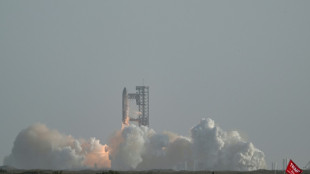 Musk's SpaceX faces new Starship setback
Musk's SpaceX faces new Starship setback
-
Trump signs executive order establishing 'Strategic Bitcoin Reserve'

-
 Australian casino firm scrambles for cash to survive
Australian casino firm scrambles for cash to survive
-
Musk's SpaceX faces setback with new Starship upper stage loss
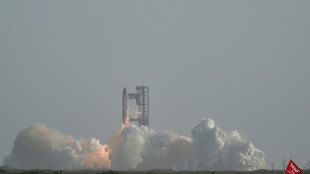
-
 US and European stocks gyrate on tariffs and growth
US and European stocks gyrate on tariffs and growth
-
Deja vu on the Moon: Private US spaceship again lands awkwardly
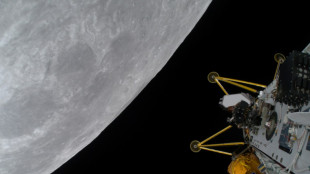

El Salvador Congress votes to end ban on metal mining
El Salvador's Congress on Monday approved a bill promoted by President Nayib Bukele to roll back a ban on the mining of gold and other metals, dismaying environmentalists.
The small Central American nation became the world's first country to outlaw metal mining in 2017, warning of the harmful effects of the chemicals used, like cyanide and mercury.
The move by Bukele's predecessor, former left-wing rebel Salvador Sanchez Ceren, reflected a growing rejection of mining by rural communities in the region.
But last month, Bukele, who is popular at home for his crackdown on street gangs, signaled that he wanted to change course.
The bill to bring back metal mining was approved by 57 deputies out of a total of 60, said Ernesto Castro, head of the legislature -- which is dominated by the ruling party -- as environmental campaigners protested nearby.
Critics fear that mining will pollute the Lempa River, which runs through a potential mining zone proposed by Bukele and supplies water to 70 percent of the inhabitants of the capital and surrounding areas.
"This wretched mining will punish the people, it will contaminate our waters and rivers and that's an attack on life," activist Vidalina Morales told reporters.
Bukele said last month that El Salvador, a country of 6.6 million people, had "potentially" the largest gold deposits per square kilometer in the world.
"God placed a gigantic treasure underneath our feet," he wrote on social media, arguing that the mining ban was "absurd."
"If we make responsible use of our natural resources, we can change the economy of El Salvador overnight," he said.
The new law stipulates that the state will be the only entity authorized to search for, extract and process mined metals.
However, the government may do so through companies in which it is a shareholder.
The bill prohibits the use of mercury in mining operations, which may not be carried out in protected natural areas or places with important water sources.
A survey by Central American University published on Monday revealed that 59 percent of respondents do not consider El Salvador "an appropriate country for metal mining."
Since El Salvador dollarized its remittances-reliant economy in 2001, it has registered average annual growth of 2.1 percent.
Twenty-seven percent of Salvadorans live in poverty, according to the United Nations Economic Commission for Latin America and the Caribbean, and 70 percent of the workforce operates in the informal sector.
Elsewhere in the region, Costa Rica and Honduras have banned open-pit mining, and Panama declared a moratorium on new mining concessions last year after mass protests over plans for a huge copper mine.
St.Ch.Baker--CPN
